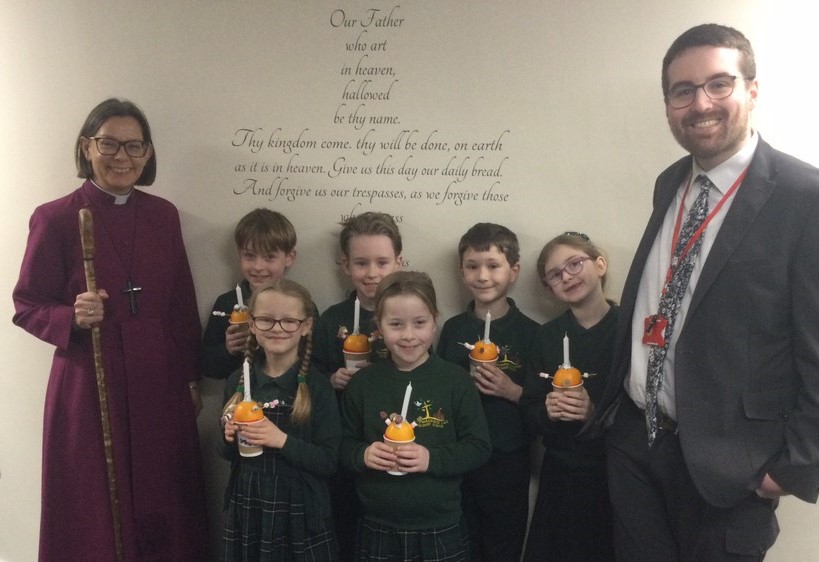
Collective Worship at Warkworth is the invigorating heartbeat of our school day, where our Christian vision comes alive in community.
Every morning, children and staff gather to pray, sing, listen and reflect together. Worship is invitational, meaning that all are welcome to engage as much, or as little, as they wish. Worship is not evangelical – the purpose of Collective Worship is to bring the school together in a spirit of unity and reflection, fostering a sense of belonging while nurturing spiritual growth and understanding.
We follow Church of England best practice that worship be “inclusive, invitational and inspiring”. This means we warmly welcome all pupils and adults, whatever their background or stage on the faith journey. No one is ever forced to pray or participate: as the CofE guidance explains, worship is offered with open doors and open hearts, and anyone may simply observe or sit quietly if they wish.
In Worship, we focus on theology, liturgy and spiritual growth. Each act of worship includes elements of Christian teaching: Bible readings or stories (encountering the life and teachings of Jesus), traditional prayers (such as the Lord’s Prayer and prayers for peace), Christian songs and hymns, and symbols like the cross or candlelight.
We believe strongly in celebrating tradition, not just for the children’s spiritual development but also as part of their cultural entitlement and understanding of British Values. This means that we often sing traditional hymns and focus on the rich heritage of Anglican worship, including well-known prayers, liturgical practices, and seasonal celebrations. By engaging with these traditions, pupils gain a deeper understanding of the Church of England’s historical and cultural influence, while also experiencing a sense of continuity and connection with the wider Christian community. This approach helps children appreciate the role of Christianity in shaping British society and its values, fostering a sense of identity and belonging without compelling belief.
We celebrate the Anglican calendar and introduce liturgical richness (for example, understanding the Eucharist or holy days) so that children become familiar with key aspects of Anglican tradition. This gives pupils a rich encounter with Christianity. In practice, this might mean reflecting on a Bible story of forgiveness and discussing its relevance to our own lives, or exploring the Trinity through creative prayer activities. Through these shared worship times, children develop spiritual awareness: they learn to be still and reflective, to pray in their own words or shared words, and to consider values like compassion and courage in a spiritual context. We deliberately link worship themes to our Christian values, helping pupils understand how theology (who God is and what He teaches) connects to living out love, peace and courage each day.
Finally, our worship is vibrant and varied. We use a range of high-quality resources, from engaging story-telling and multimedia to traditional chants and rhythms so that worship remains inspiring. As guidance notes, there is “no value in a watered-down, lowest common denominator version of faith”: instead, we present the fullness of Christian worship (through music, liturgy and creative expression) while ensuring it is warm and authentic. In short, Warkworth worship offers pupils the opportunity to encounter God and our heritage of faith in ways that are welcoming and meaningful. It helps them ask important spiritual questions and see their role within a Christian community – for example, hearing about Saint of the Day or caring for those in need – and thus enables our pupils to grow in theological understanding, liturgical knowledge, and personal faith.
A typical week
- On Mondays, Tuesdays, and Wednesdays, worship typically follows a theme. This could reflect a specific time of year (like Lent), major events (such as Remembrance Day), or aspects of school life (like revisiting our theological vision and values). While all staff have opportunities to lead, the headteacher usually leads on Mondays and Wednesdays, with a member of the St Lawrence’s Church team leading on Tuesdays.
- Thursdays are dedicated to Singing Praises, led by the trust’s Music Lead. This lively session not only engages children in singing but also deepens their appreciation of spiritual and Christian music. Later in the day, staff follow up with Class Worship tailored to each group.
- Fridays are Celebration Worship, where we recognize how pupils have embodied our school vision and values. This includes awarding certificates for demonstrating Love and Courage, as well as celebrating achievements outside of school. These gatherings are firmly rooted in Christian worship, reinforcing our community’s shared values.
Spirituality
At Warkworth, we understand spirituality as the sense of connection, wonder, and purpose that underpins our human experience. Drawing on Rebecca Nye’s concept of “relational consciousness”, we encourage children to explore spirituality through moments of stillness, reflection, and shared experience. Our worship fosters an awareness of self, others, the world, and God. In line with SIAMS guidance, our worship includes space for contemplation, helping pupils make personal and spiritual connections with the themes explored. Through stories, prayer, and reflective silence, pupils are invited to develop a sense of awe and wonder, considering how faith and values impact their lives and relationships.
Spirituality is not confined to Worship and is a central part of our offer to all within our community, including staff and children. However, Worship is a central opportunity to explicitly teach spirituality.
Ways in which we teach spirituality include:
- Rootedness: we encourage children to root themselves in the present moment and to recognise where they are. We invite children to accept however they are feeling and that they are loved for whatever and however they are feeling.
- The Up-In-Out model: we encourage children to consider spirituality from inside first, and how they feel, helping them develop their personal identity. We then ask them to consider the wider world – this could be those sat in the school hall with us or the entire world. The Up is to consider what is greater than us – this could be God, gods, the universe, or whatever the children think is appropriate.
- Silence and music: Periods of silence or guided music listening are used to provide reflection in the business of our lives. This is just as important for the children as it is the adults!

